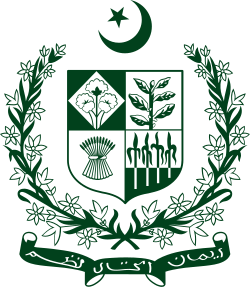 |
|---|
| Part of a series on Orders of succession |
| Presidencies |
|---|
The line of succession to the Presidency of Pakistan is the order in which persons may become or act as the President of Pakistan upon the incapacity, resignation or death of an incumbent President. Pakistan, by law, has a parliamentary democratic system of government that has been modified several times since its inception. The prime minister of Pakistan is the head of the government, while the president of Pakistan, by law and by statute, is a constitutional figurehead. [1]
Contents
- Current order of succession
- Succession acts
- Article 49
- Past presidential successions
- See also
- References
- External links
The constitution does not include a position of Vice President, but in absence of president of Pakistan, the Chairman of the Senate of Pakistan acts as the President. [2] If the Chairman, for any reason, is unable to perform the functions of the office of the president, the Speaker of the National Assembly acts as president until a president is elected. [3] The Electoral College of Pakistan (a special session of the parliament, senate and all four provincial assemblies) elects a new president in accordance with Article 41(3) of the constitution. [4] Amendment XVIII, Article 49 of the constitution of Pakistan covers this matter.

